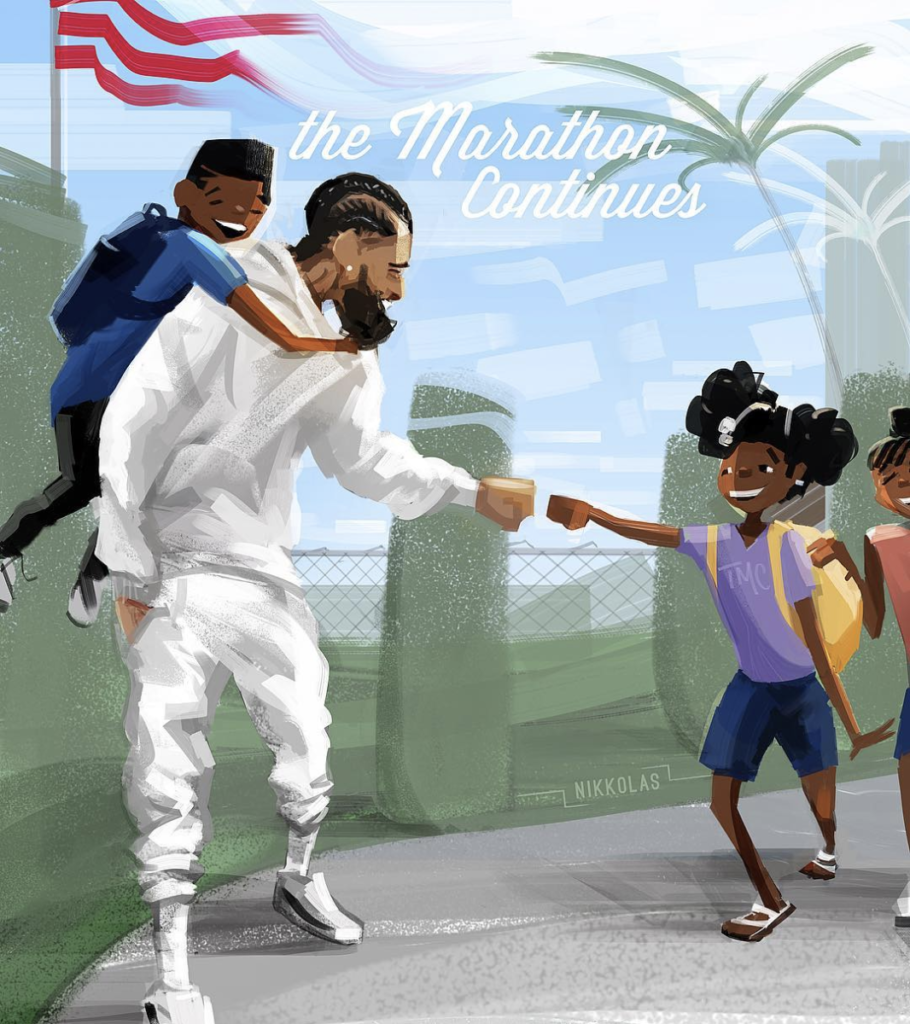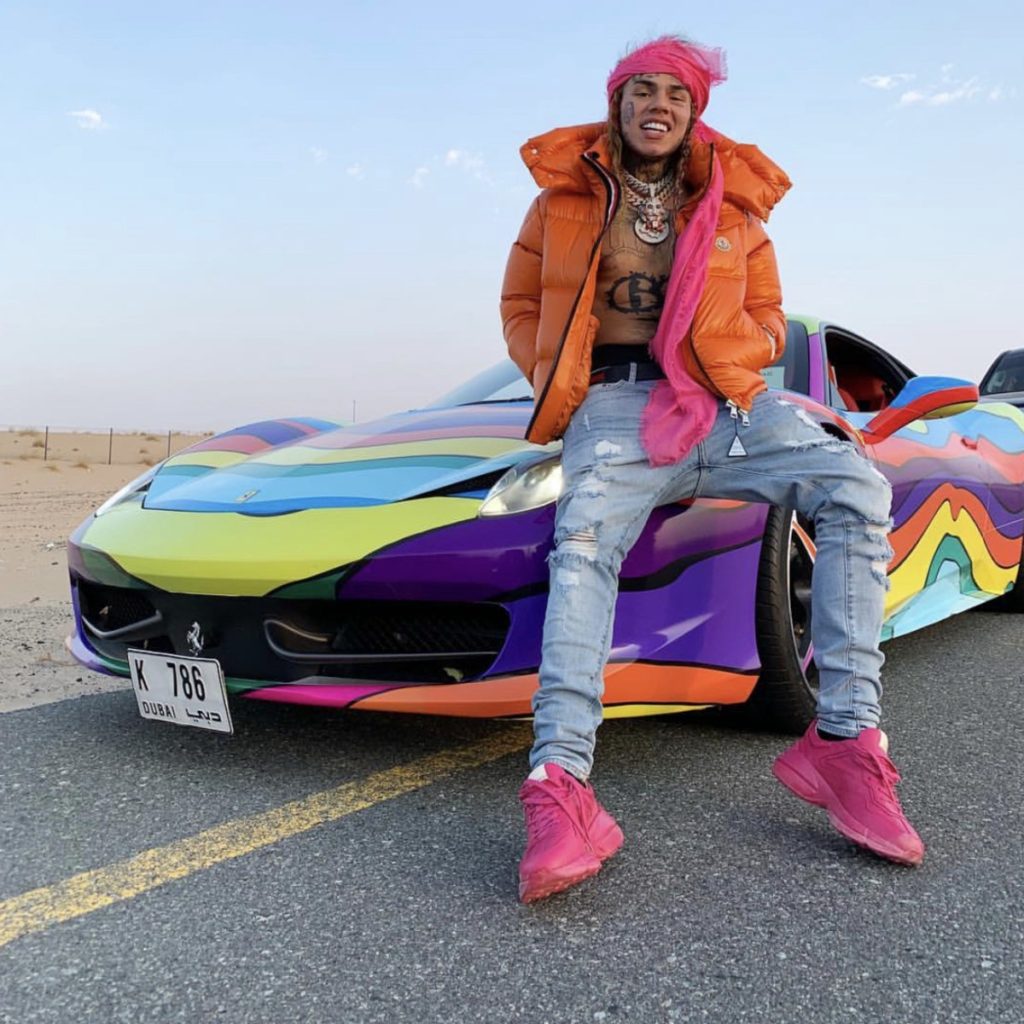
Just over a week ago, Los Angeles-based rapper Nipsey Hussle was shot and murdered on Sunday, March 31st. As a recent fan and admirer of his music and community engagement, I and the global hip-hop community are deeply saddened by the sudden loss of Hussle. Over the past few years, I’ve always considered Hussle as an underground artist from the west coast, and as an east coast Bronx native, he wasn’t on my radar. I knew he had an impact on the hip-hop community on the west coast, but he did not catch my attention until his Grammy-nominated album Victory Lap; it was also his first. Victory Lap shares stories of gangland survivalism and powerful messages of Black entrepreneurship and community building. I started doing my research on Nipsey Hussle by watching his music videos and interviews to gain a deeper understanding of him as an artist. I quickly realized that Nipsey Hussle was a true advocate for the betterment of his community. According to the Los Angeles Times, at the age of 19, Hussle took a three month trip to his father’s homeland, Eritrea — a small country located in the horn of Africa — where he spent time connecting with his culture and family whom he had never met before. His trip to Eritrea, where he saw Black people in leadership and in control of their government, and this experience opened his eyes to “the way things could be,” and influenced his identity as a community advocate and entrepreneur.
Many communities mourn the loss of Nipsey Hussle because we lost someone who cared. Hussle encouraged Black people to be entrepreneurs and highlighted injustice found and experienced within inner-city communities in his music. More importantly, he was also an advocate for the very same community that raised him by creating various opportunities for those who have been pushed to the margins of society. We lost a true pillar of service to our communities, but this does not mean that his legacy should not carry on. Hussle is an exemplar of what all educators should strive to be in their communities and within their classrooms. Educators can continue the legacy of Nipsey Hussle in their classrooms by:
Empowering Students to Advocate for Their Communities
Nipsey Hussle was an advocate for his community. As someone who was once affiliated with a gang, he often spoke about his experiences with gang culture and police brutality. Hussle sought to create solutions for community members who were negatively affected by gang violence. Los Angeles Police Commissioner, Steve Soboroff, shared via Twitter that he was scheduled to meet with Nipsey Hussle to discuss gang violence and ways to support young people who come from neighborhoods that often have ties to gangs. Hussle used his platform to advocate for his community and was in the process of creating solutions to address gang violence. Hussle also advocated for STEM education by investing in Vector 90, a co-working space and STEM center located in the Crenshaw district that is dedicated to addressing the lack of diversity in the science, technology, engineering and mathematics fields.
As educators, we must carry on the legacy of Nipsey Hussle by empowering students to advocate for themselves and each other. In his book, For White Folks Who Teach in the Hood, Chris Emdin discusses ways teachers must utilize the context of the community of their students as a form of pedagogy. This means facilitating connections between community artifacts, community members, community spaces and content. In the same spirit, teachers must empower students to identify issues that negatively affect the community and design practical solutions to address these issues beginning in, but not limited to, the classroom. Hussle served as a bridge between police authority and a community that was negatively impacted by its abusive authority. In the same vein, educators can serve as a bridge between their students their communities.
Creating Opportunities for Students to Inform their Communities
In addition to being an advocate for his community, Nipsey Hussle understood the importance of sharing important information with his community. Hussle exemplified how a leader in education can use and spread knowledge for the greater good. Educators can create opportunities for students to engage in research and collect data around community issues such as gun violence, health disparities, and food deserts, lack of funding in education, etc. Creating these opportunities in the classroom opens doors for students to appreciate how being informed gives the community a choice in understanding how these issues interact and build towards unjust systems. A critical and solutions-based mindset on these systems facilitated by teachers and leaders provides an opportunity for community members to actively and collectively work together to dismantle these systems by encouraging ideas about ownership over their impact on their communities.
Take Hussle for example, who in 2018 began working on a documentary about Alfredo Bowman also known as Dr. Sebi, a Honduran herbalist and self-proclaimed healer who claimed to cure all disease with herbs and a unique vegan diet. Through this informational documentary, Hussle was focused on promoting holistic and homeopathic healthcare to counter-narratives of big pharmaceutical companies who insist that only prescription drugs can cure illnesses. Here, Hussle worked to inform his community to enhance their options in healthcare, which promotes community members to have control over the choices they have to heal their bodies and minds. Hussle showcased the power of information and having access to knowledge to better one’s community and educators can too.
Highlighting and Encouraging Entrepreneurial Spirit
At his core, Nipsey Hussle was an entrepreneur. He was an independent artist for over a decade selling his mixtapes for up to one-thousand dollars. Hussle invested in several real estate projects, as he understood the power of owning land and businesses and how Black-owned business can support the Black community as opposed to push them out of their communities. Hussle reportedly invested in the purchase of a strip mall property in the Crenshaw district where his Marathon Clothing store is located. Hussle’s grew up just down the road from his Marathon Clothing store and shared with Forbes that he would cut grass and shine shoes to make a few extra dollars for himself as a child. Hussle, like many young people, had an entrepreneurial spirit that should be fostered in schools. It’s essential for educators to emphasize entrepreneurs who look like our students and come from the same communities and share their successes including their failures and motivations.
Often, educators tend only to share the narrative of going to college as the only path to obtain success, when it is not. I argue that a fostered entrepreneurial spirit coupled with the skills, resources, and knowledge gained from a college education can provide opportunities for young people to develop business ventures that can in-turn support the betterment of their communities. Students need encouragement and guidance from educators to support their dreams, even if they do not align with our aspirations or follow a traditional path. This is not to say we should deter students from gaining necessary skills or going to college if they desire, but it is to say that educators need to recognize that young people in many instances have limited choices that inspire them to be innovative in their approaches to life and survival. These approaches are not always the safest ones, so as educators, we must foster and encourage this innovative and entrepreneurial mindset in positive ways because it can provide alternative opportunities for our youth’s experience in shaping their futures.
Right now, there is a local community leader in every hood who embodies the legacy of Nipsey Hussle. It is imperative that you seek and find this person and others like them and welcome him/her into your space to engage in dialogue with your students. Further, it is the youth in your classroom that embodies the legacy of Nipsey Hussle. It is up to us to create spaces within schools that inspire students to remain and give back to their communities. We, unfortunately, lost Nipsey Hussle, but this doesn’t mean that his work and legacy does not deserve to live on. We all must do our part to ensure that #TheMarathonContinues.





